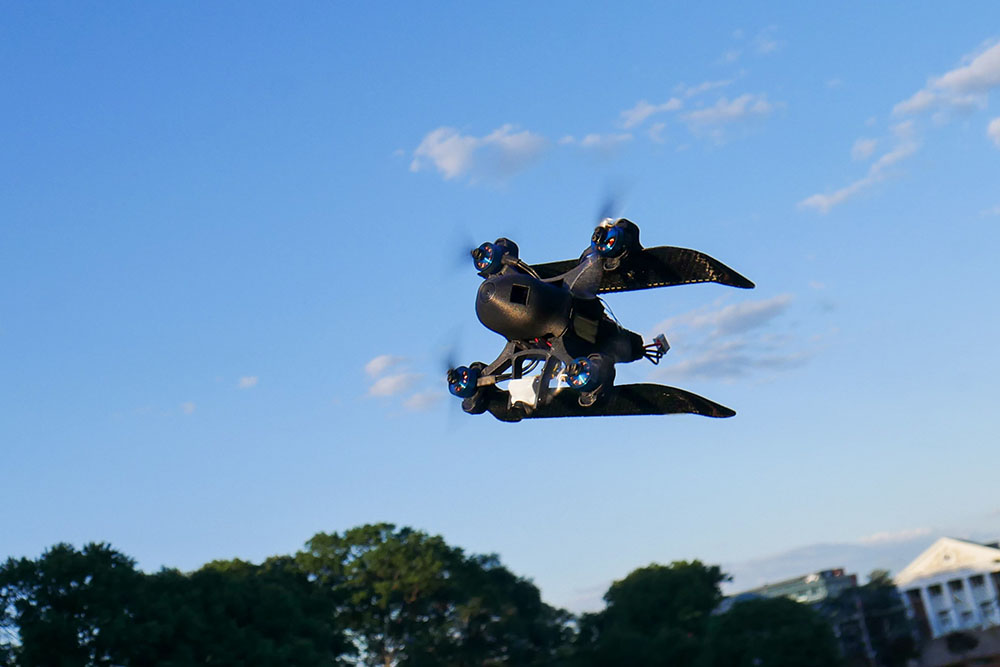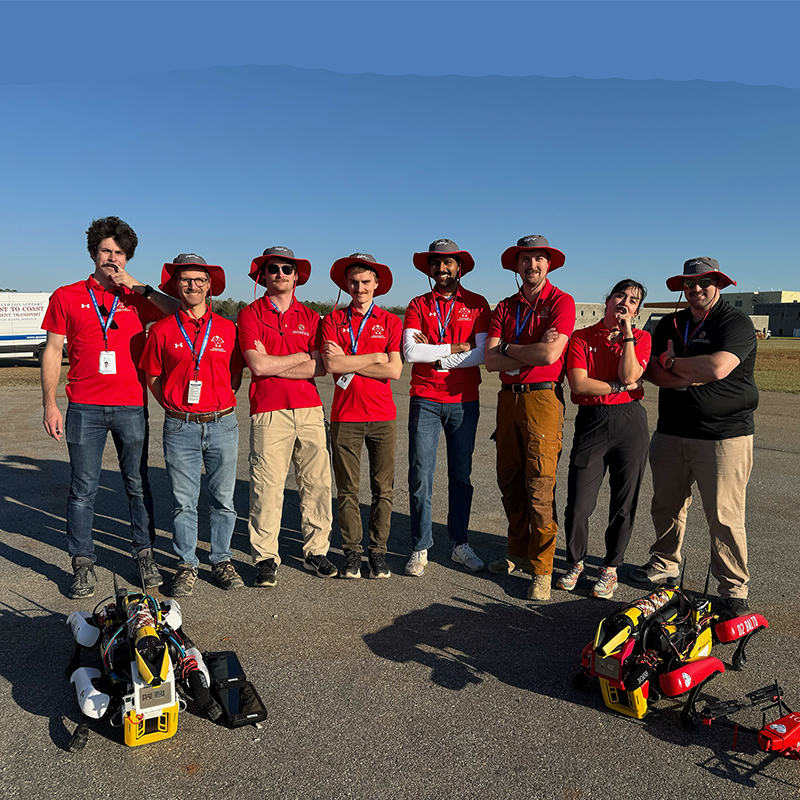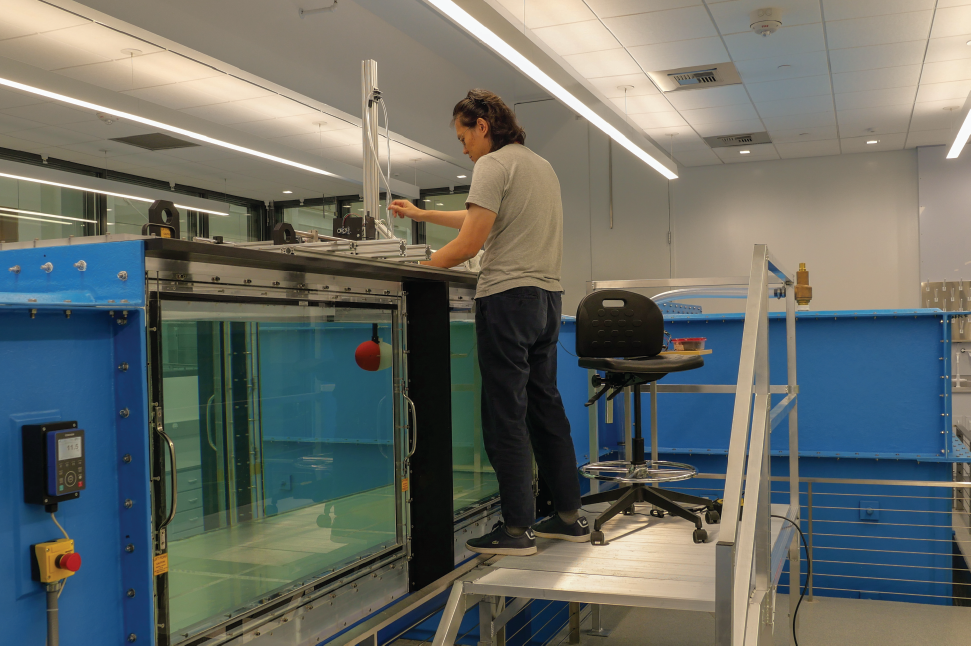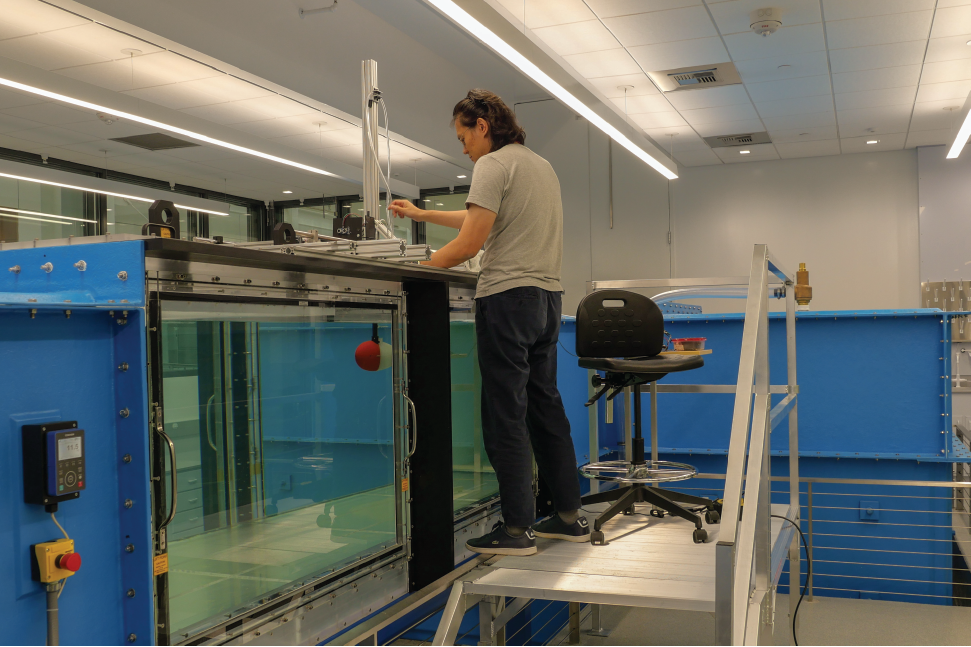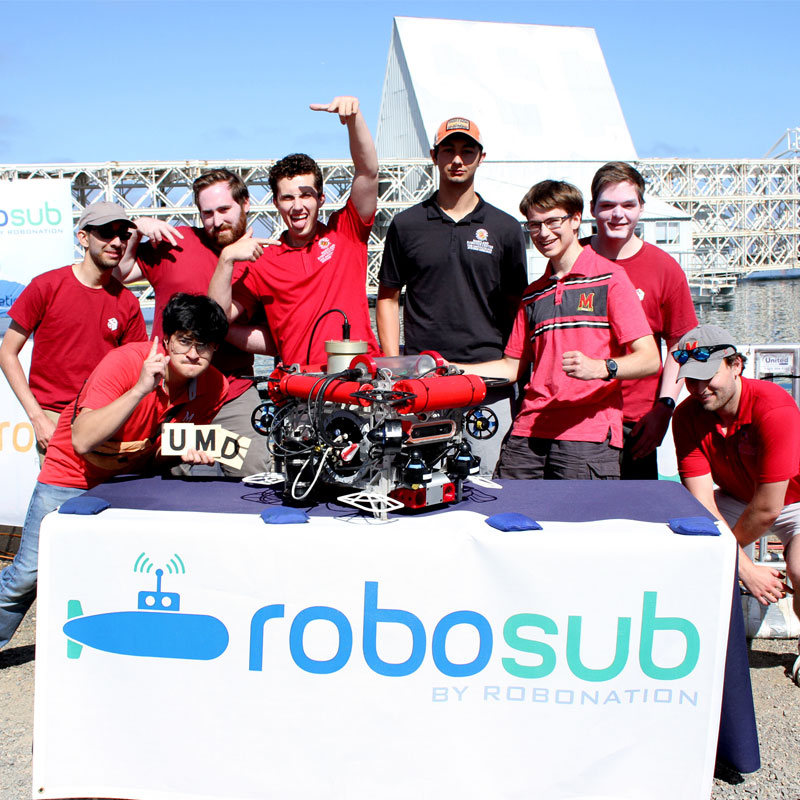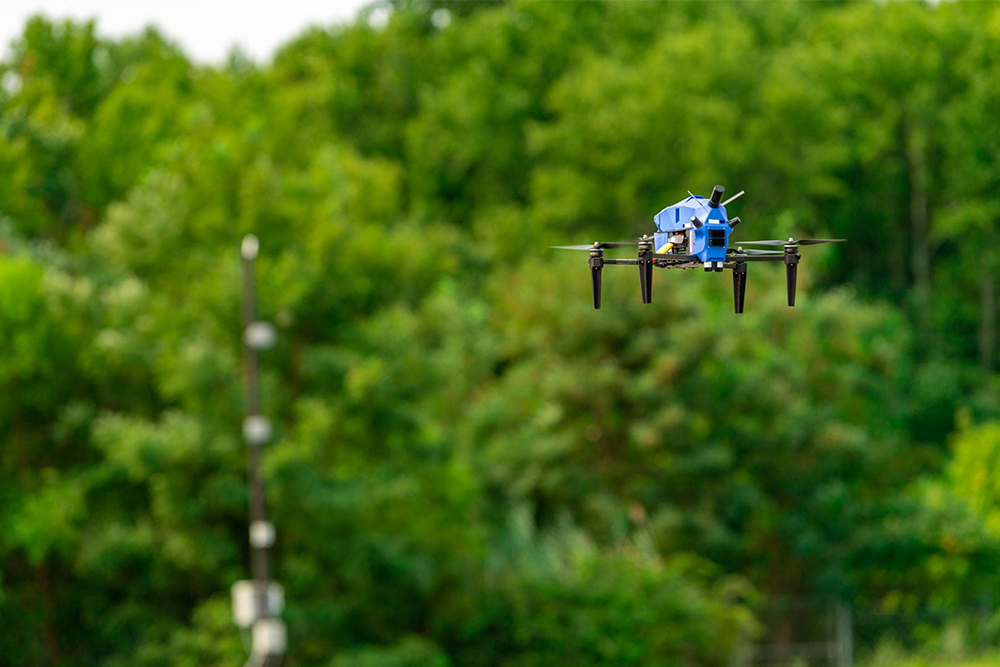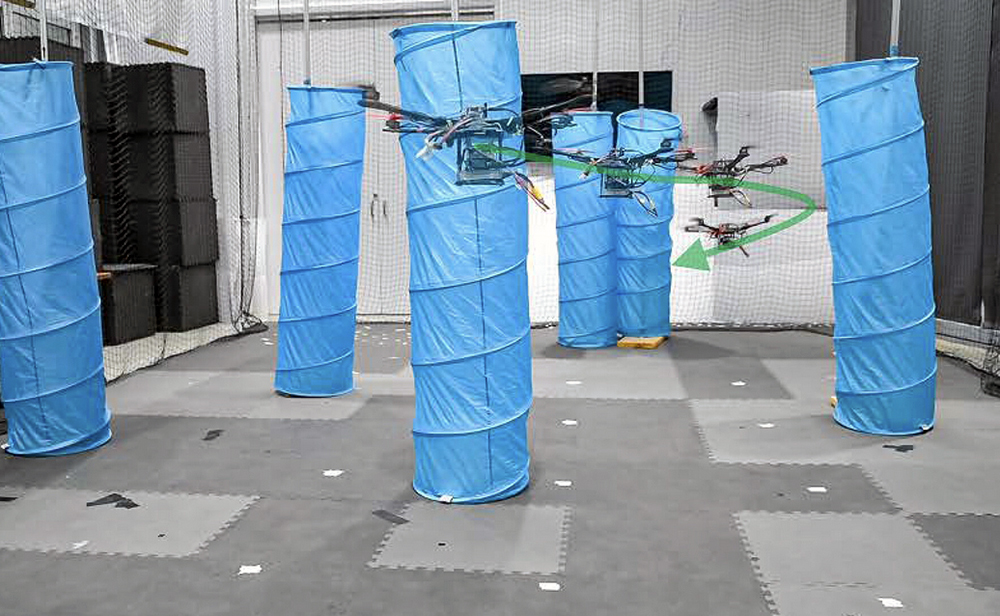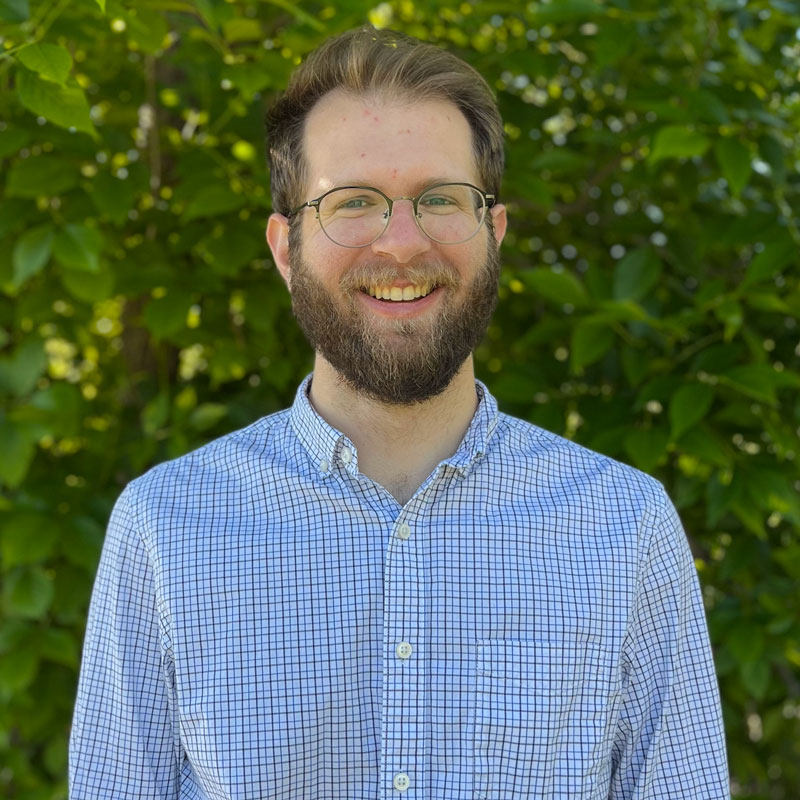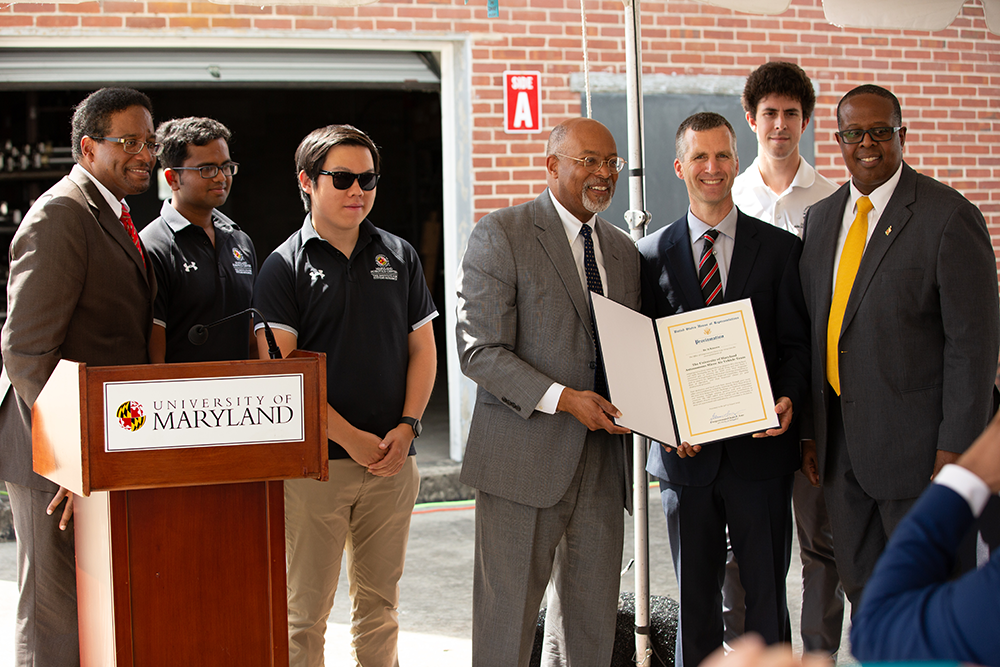News Story
UMD Dedicates IDEA Factory
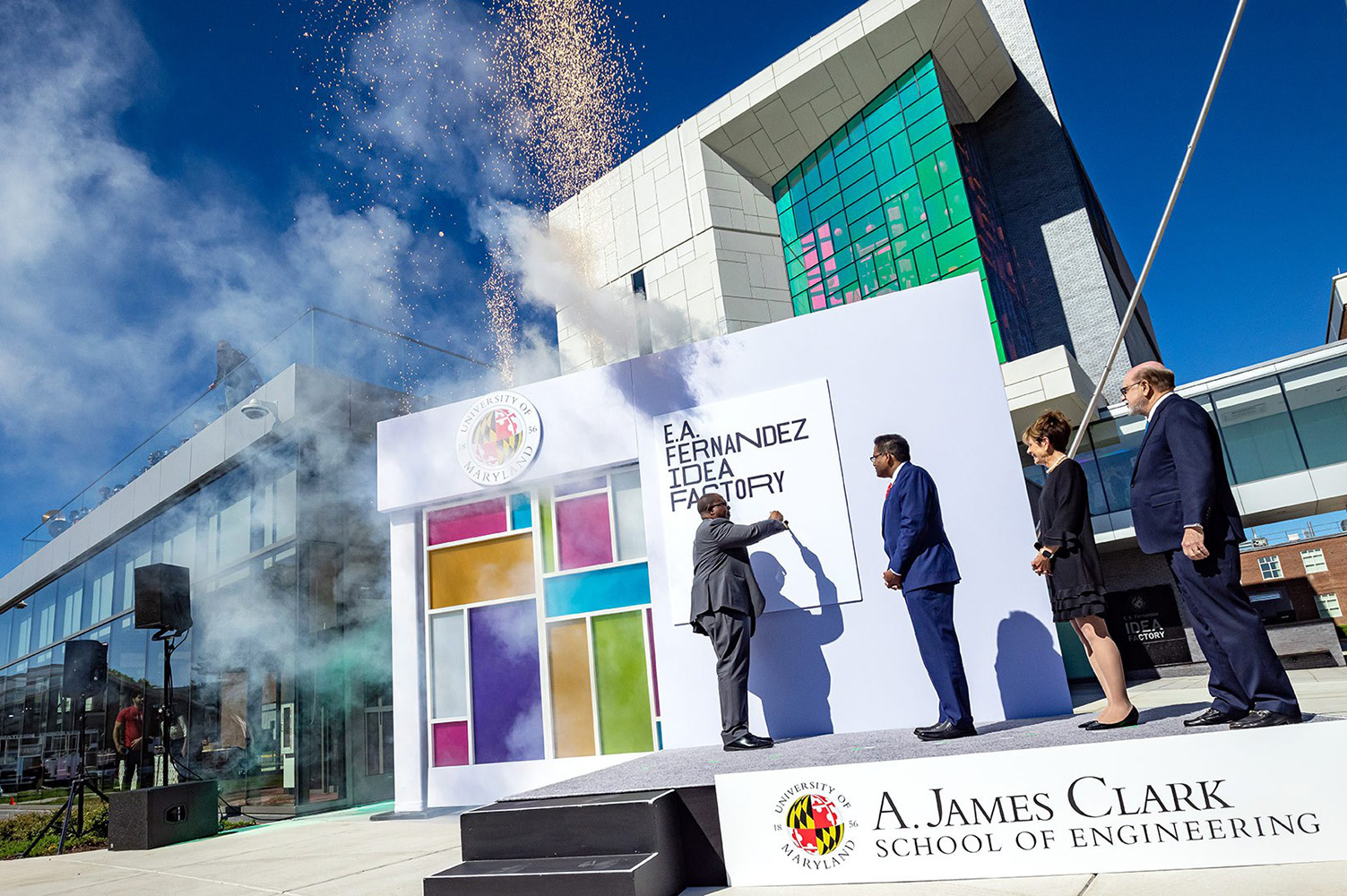
From left, Maryland Engineering Dean Samuel Graham, Jr.; University President Darryll J. Pines; Courtney Clark Pastrick; and Emilio Fernandez ’69 ceremonially “unlock” the new IDEA Factory at this morning’s dedication ceremony. Photo: Stephanie S. Cordle
The University of Maryland this morning dedicated the E.A. Fernandez IDEA (Innovate, Design and Engineer for America) Factory, a $67 million building designed to foster technology innovations and advances through collaboration across engineering, the arts, business, and science. The A. James Clark School of Engineering’s new 60,000-square-foot facility is the only building at UMD funded entirely by private philanthropy.
“The IDEA Factory is a spectacular addition to UMD’s robust and growing innovation ecosystem,” said university President Darryll J. Pines. “Its world-class facilities for education, innovation, research, and product development in robotics, quantum, engineering, transportation, and manufacturing will be transformative. Inspired by a namesake who brought pioneering ideas to market, our community will conceive ideas, create designs, build prototypes, develop business plans, and bring to market products that will spur economic prosperity in the region, state, and nation.”
Located next to the Jeong H. Kim Engineering Building, the IDEA Factory features research and student programs and activities including the:
- ALEx Garage: This first-floor space is dedicated to student competition teams such as Terrapin Rockets and Robotics@Maryland, as well as a rapid prototyping lab equipped with 3D printers and other in-demand gear.
- Alfred Gessow Rotorcraft Center: Lockheed Martin gave $2.5 million to equip the center’s new home on the fourth and fifth floors, where faculty and students will conduct research on rotorcraft aerodynamics, structures, and flight mechanics. It also boasts a monorail hoist, a giant, yellow crane-like device that can haul heavy equipment up from the ground.
- Robotics and Autonomy Laboratory: In this third-floor hub for advancing robotics systems, students can work with Spot, a mobile robot from Boston Dynamics, and an unmanned ground vehicle called Husky from Clearpath Robotics.
- Quantum Technology Center: Below grade level with a 3.5-foot-thick concrete floor to isolate delicate experiments from environmental interference, this joint center between the Clark School of Engineering and Department of Physics is where students and researchers focus on translating quantum physics into real-world technologies.
- Startup Shell: Founded in a storage closet in 2012, the popular student business incubator now has a spacious new first-floor home in the Tom & Susan Scholl Center for Student Innovation where Terps can collaborate and network to scale up student-run startups and take them out to the world.
- Angel P. Bezos ’69 Rapid Prototyping Lab: Equipped with 3D printers and other gear, the lab joins UMD makerspaces.
- Pedro Wasmer ’62 Conference Room: This conference room can be divided into two spaces for maximum flexibility for various types of meetings.
- Ortanez Family Terrace: Located on the second floor, contiguous to IDEA Central, the Ortanez Family Terrace is a meeting point for faculty, staff, and students to enjoy the outdoors.
- Randy Ortanez ’82 Innovation Bridge: This skybridge connects the IDEA Factory to the Jeong H. Kim Engineering Building.
- Robert J. Flanagan Collaboration Corner: A gathering place for students to study and interface in a more casual environment.
The IDEA Factory’s movable walls and shared spaces will promote dialogue between students, entrepreneurs, and faculty who are working in fields such as multimedia, robotics, rotorcraft, and quantum engineering. Particularly striking is a façade dominated by an enormous window made from laminated glass treated with a film that creates radiant color shifts, based on where viewers are standing.
“Engineering brings together great minds—people with different backgrounds and perspectives, looking at the same challenge in different ways—to collaborate on solutions that serve humanity. The IDEA Factory will catalyze those collaborations.”
— Clark School Dean Samuel Graham, Jr.
“Engineering brings together great minds—people with different backgrounds and perspectives, looking at the same challenge in different ways—to collaborate on solutions that serve humanity. The IDEA Factory will catalyze those collaborations,” said Clark School Dean Samuel Graham, Jr. “When the world looks for solutions, it comes to Maryland Engineering. We are incredibly appreciative of our supporters for giving our students, faculty, and staff a new place to do cutting-edge work.”
The building is named for Emilio Fernandez ’69, a Maryland engineering alum, entrepreneur, and inventor who holds dozens of patents, including one that defined e-reading devices and is the most-cited U.S. patent ever issued. Many of these patents were co-invented with his friend, business partner, and fellow Terp Angel Bezos ’69. Their inventions and their company, Pulse Electronics, transformed railroad operations. The building's cornerstone gift came from the A. James & Alice B. Clark Foundation’s Building Together: An Investment for Maryland in 2017.
Fernandez said he hopes the IDEA Factory will accelerate the inclusive collaboration that our society needs in order to solve its grand challenges. “Today’s problems are complex, and they require interdisciplinary solutions,” he said. “We have to combine our specialties so that our knowledge evolves into products and services that help humanity.”
The new IDEA Factory is the latest infrastructure addition to UMD’s vibrant innovation ecosystem. It includes UMD’s Discovery District, as well as the Brendan Iribe Center for Computer Science and Engineering (2019), a hub for technology, collaboration and discovery; A. James Clark Hall (2017), designed to foster development of transformative engineering and biomedical technologies to advance human health; and the Physical Sciences Complex (2013), created to provide ideal conditions for scientific collaboration, research, and innovation with partners across campus and at local federal agencies like the National Institute of Standards and Technology, NASA Goddard, and the National Institutes of Health.
Published May 10, 2022

